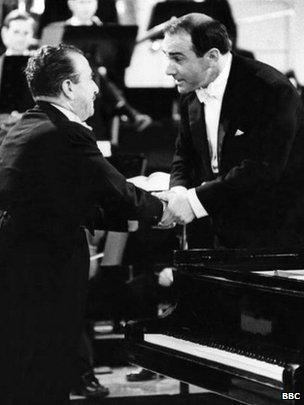Conductor George Hurst dies at 86
- Published

Conductor George Hurst, known for his work with the BBC Philharmonic and the Bournemouth Symphony, has died aged 86.
The son of a Romanian father and Russian mother, Hurst was born in Edinburgh in 1926.
He won early distinction as a composer while a student at the Royal Conservatory in Toronto, Canada.
From 1958 to 1968, he was principal conductor for the BBC Northern Orchestra, and is credited with establishing it on the global stage.
The orchestra, based in Salford, is now known as the BBC Philharmonic.
David Ellis, the producer of the BBC Philharmonic between 1964 and 1986, said Hurst gained "respect for turning the orchestra into a professional, well-run symphony orchestra".
"He always kept great affection for it," he added.
Describing the conductor's working practices, Ellis continued: "George disliked management and being managed. He was very difficult in the nicest possible way.
"He was very, very professional and very, very polite but he wanted things done in a particular way."
He said Hurst hated bureaucracy and that his philosophy was to "work at a pace that will bring the finest results to the public".
"He loved the orchestra, he loved his car - a Bristol - and he loved beautiful women."
London debut
Hurst was known for the expansive sweep of his baton, and for allowing principal musicians the room to explore their own take on well-known pieces such as Handel's Messiah and Elgar's Enigma Variations.
Over his long career, the conductor worked with every major British and Irish orchestra, as well as European ensembles including the NDR Symphony Orchestra, the Orchestre de Paris, the Royal Danish Orchestra, and the Israel Philharmonic Orchestra.
However, he started his professional career as a writer, having been appointed professor of composition at the Peabody Institute of Baltimore at the age of 21.
By 1950, he was simultaneously the conductor of the Peabody Conservatory Orchestra and the Symphony Orchestra of York, Pennsylvania. At this time, he continued his studies under noted French conductor Pierre Monteux.
His return to Britain was precipitated by pianist Dame Myra Hess, and he made his London debut in 1953 with the London Philharmonic Orchestra, for which he served as assistant conductor until his appointment as principal conductor of the BBC Northern Orchestra in 1958.
In 1968, he established the Bournemouth Sinfionetta, and acted as artistic advisor to both this orchestra and the Bournemouth Symphony until 1974.
'Transfiguring'
Hurst also taught a masterclass at the Canford Summer School of Music in Dorset for 63 years.
Malcolm Binney, director of music for the summer school, said: "He changed people's lives. He was charismatic, had incredible technique and all the people who worked with him adored him."
Hurst was also a visiting professor at the Royal Academy of Music.
Among his pupils were Andrew Davis, John Eliot Gardiner and Simon Rattle. He had inadvertently inspired the latter to pursue music as a child.
"When I was 11, my father took me to hear George Hurst conduct Mahler 2 and that was it," Rattle once recalled.
"That was a completely transfiguring experience. It was the road to Damascus."
Another pupil was Simon Halsey, now director of the City Of Birmingham Symphony Chorus. He said Hurst had given him the single most important piece of advice he had ever received.
"I went to see him and said, 'I want to be a professional conductor,'" Halsey recalled.
"He said, 'what you want to say is, "I want to be a conductor". If someone is foolish enough to pay you for it, that's all to the good'.
"That made me realise that the desire to do it is all important. To earn one's living from it is neither here nor there."
Paying tribute on his Slipped Disc blog, music journalist and broadcaster Norman Lebrecht called Hurst "a gentle maestro".
"Hurst was a great conductor with no airs or graces," he noted, and was "therefore greatly under-rated".